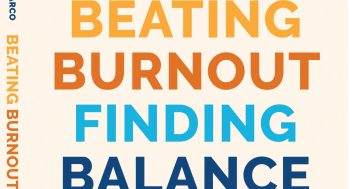Ashley Stahl* has some answers for people experiencing high stress and burnout that do not involve looking for a new job or dropping out and going to live in a cave.
 More people are feeling burned out at work than ever before.
More people are feeling burned out at work than ever before.
Burnout — the overwhelming feeling of mental and physical exhaustion — even affects those who usually enjoy their jobs.
With economic pressures rising and endangering our social needs and relaxation, it seems we’re all exhausted.
As a career coach, I have had many clients come to me outlining signs of burnout and thinking they need to do a 180-degree flip on their entire career.
While that may be the case for some people, it isn’t always the only solution.
Burnout means you need to slow down and take care of yourself so you can not only love your job again, but be happier in your non-work time.
Here is some advice on how to tackle burnout.
Acknowledge you are burnt out
Some key indicators are mental and physical exhaustion induced by repeated pressures and stresses.
One indicator is that after a long night’s sleep, you don’t wake up feeling rested.
Others include forgetfulness/impaired concentration and focus; increased illness; loss of appetite; depression, and anger.
If you are feeling these symptoms, and they are affecting your life beyond work, it may be worthwhile exploring professional mental health options.
Talk to your boss
Don’t be afraid to talk with HR or your boss about your burnout.
The burnout phenomenon is well known, and they are likely to sympathise with your plight and work with you on a solution.
Before you head into the conversation, have a plan in place and a few options for what would help you most.
Walking in prepared with solutions will show your manager you are serious and want to take action.
Take time off
One of the only ways to properly recover is to detach yourself from your work environment for a while.
Taking a vacation could be the thing that saves your career.
People who take vacations are proven to have lower stress, less risk of heart disease, a better outlook on life and more motivation to achieve goals upon returning to work.
Whether you take a couple days off, a week off, or longer, it is much-needed time to get back into your groove and regain your energy and enthusiasm.
Love your job again
During your time off, you will find yourself immersed in precious moments of much-needed sleep, relaxation and recalibration.
It is also a good time to discover ways you can avoid burnout when you return to the office.
A great place to start is by doing some intentional reflection. Take a couple hours every day to reflect on reasons why you are grateful for your job.
Remember why you took the job in the first place, and recall the enthusiasm and energy that you once had.
While it certainly may be on the depletion-side now, it is not too late to regain it, especially if you can shift your focus to reasons why you are grateful for your job.
Know your limits
Taking on more than you can handle is a sure way to get burnt out, and it is also the easiest way to get bitter toward your boss or your work.
Ask yourself: Am I over-exerting myself at work?
When you are burnt out, it may feel difficult to make decisions. This is where list-making steps in and has the capacity to be helpful in taking action and moving back into joyful living.
In a journal, with a coloured pen of choice, write down your official duties at work and only what you need to do in your position.
In a different colour, continue that list of tasks that you do not necessarily need to do and that stress you out, but you do them anyway because you find it difficult to say no.
After you visually see all of the extra and unnecessary work you have been doing, make a commitment to yourself to start tactfully saying “no” as a way to honour your limits.
Organise your desk
This may seem counterintuitive because it seems like an extra work-related task but, in the long run, it will actually help you work with less stress.
Try to devote an hour to organising your desk and your papers. Pick a day where you can stay for an extra hour to organise your space.
An organised desk has been shown to increase productivity, and feelings of productivity generally reduce those of burnout.
Throughout your work day, take time to unwind
While you are working, whether from home, in an office or in a restaurant, be sure to take frequent breaks.
A recent study has shown that taking breaks throughout the day can increase your mental wellbeing, as well as your productivity.
Your body has wisdom, so listen to it — and use your breaks wisely.
Break time is when you stretch, read a chapter of an inspiring book, take a small walk, drink water or have a snack.
Don’t work during playtime
It is very easy for work to follow us around.
You can hear your email notifications going off while eating out for dinner or receive a work call while you are relaxing at the beach.
While there are perks to being easily connected, there can be some serious downsides to the increased difficulty of creating clear boundaries between your work and personal life.
Preferring to stay in bed and read a good book is not an indicator that you need a new job; it is an indicator that you need to slow down, relax and respect your boundaries.
*Ashley Stahl is a career coach, keynote speaker, podcast host and author. In a previous life she was award-winning counter-terrorism professional. She can be contacted at ashleystahl.com.
This article first appeared at ashleystahl.com.











